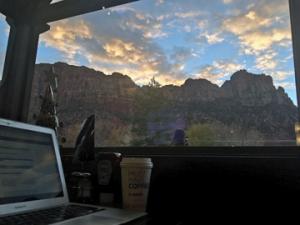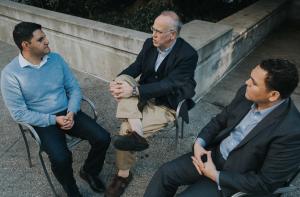In yesterday’s post, I suggested that, for many of us, the paradigm of contentment would be the archetypal person-sitting-on-a-beach-drink-in-hand, someone with nothing to do but enjoy the pleasures of the moment. No worries. No responsibilities. No deadlines.
I’ve sometimes heard a Christian version of this paradigm, one in which we find real contentment in life by contemplating God’s glory and basking in his love. Those who think in this way speak of being completely fulfilled through their relationship with God. Ultimately, contentment comes through knowing God and nothing else.
But is this a truly biblical vision of human contentment? I am not convinced, no matter how godly it sounds. Rather, I think we will be contented when our life is centered in God, filled with God’s presence, and lived actively in the world for God’s purposes.
Consider, for example, the creati on of humankind in Genesis 1-2. There we see God the creator, making all things good, including man and male and female. We’re told that we have been created in the image of God. In context, this suggests that we have been made by God to be and to do like God. We are to be creators, not in the divine sense, but rather in a limited sense, by using what God has made and the power he has given us to create goodness in the world.
on of humankind in Genesis 1-2. There we see God the creator, making all things good, including man and male and female. We’re told that we have been created in the image of God. In context, this suggests that we have been made by God to be and to do like God. We are to be creators, not in the divine sense, but rather in a limited sense, by using what God has made and the power he has given us to create goodness in the world.
This is made explicit in the verse that follows the creation of man as male and female:
God blessed them, and God said to them, “Be fruitful and multiply, and fill the earth and subdue it; and have dominion over the fish of the sea and over the birds of the air and over every living thing that moves upon the earth” (Gen 1:28).
Human beings are not simply to sit on a beach and enjoy the beauty of creation. Nor are they simply to sit in a cathedral and enjoy the beauty of God. Rather, they are to be actively involved in creation and cathedral, being fruitful, multiplying, and exercising dominion. This suggests that we will be truly content as creatures when we are doing that for which we have been created. Moreover, by implication, if we are not being fruitful in our lives, if we are not exercising dominion over creation, then we will be rightly discontent.
It seems to me there is a profound irony here. In our day, people often work themselves to the bone because they are discontent concerning possessions. They want more so they work harder and longer, seeking false contentment that is shallow and temporary. Some Christian teachers, noting the follow of such workaholism, attempt to call people out of this rat race by minimizing the value of work and claiming that true contentment is to be found in relating to God through worship services, personal devotions, and prayer. Yet, by neglecting the created connection between contentment and work, these well-meaning Christians end up leading people away from part of what is essential for human contentment. To be sure, part of our souls will be fulfilled only as we engage with God in prayer and worship. But, Genesis 1 suggests that God has made us to work in his world as his agents. Therefore, we will only be fully content when we learn to worship God, not only in praise and prayer, but also in our daily work.
I’ll expand on what I’m saying here tomorrow.















